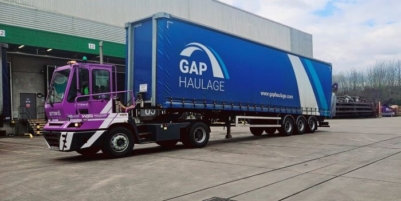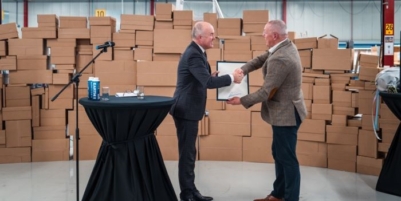-
Nutrivend selects Forterro’s Orderwise to support online expansion and streamline operations - April 11, 2025
-
ARROWXL LAUNCHES AMBITIOUS ZERO WASTE ROADMAP - April 8, 2025
-
THE BCMPA’S NEW CAMPAIGN DRIVES OUTSOURCING SUCCESS IN Q1 - April 7, 2025
-
BLACKOUT TECHNOLOGIES TARGETS TELEMATICS-INTEGRATED MOBILE DEVICE BLOCKING TO COMBAT SMARTPHONE DISTRACTION - April 1, 2025
-
Sparck Technologies awarded Royal designation - March 27, 2025
-
OpenADR Alliance announces first OpenADR 3.0 certified products with EVoke Systems, E.ON Energy and Universal Devices - March 25, 2025
-
Growing fulfilment and contract packer appoints new Managing Director - March 25, 2025
-
When is it time to invest in a WMS? Understanding the key trigger points - March 25, 2025
-
eCapital helps Vantage Recruitment on its journey to financial success - March 24, 2025
-
Hugo Beck Celebrates 70 Years of Packaging Innovation with Open House Events - March 20, 2025
NEW RESEARCH – ‘Digital assistants’ make work better as businesses weather growth and productivity challenges
Independent global research, sponsored by Work Execution System pioneer, Laiye, lays out economic risks of ‘broken work systems’ and details how AI-driven digital assistants will ‘Make Work Better’
Laiye, a pioneer in the Work Execution System category, currently serving one in five Fortune 500 companies, today unveiled global independent research into ‘white collar’ office work. The study surveyed 1,300 respondents across four continents, revealing the negative effects of today’s work processes on workers and businesses, known as the Work Execution Gap. It also shows how the use of AI technology helps to overcome these challenges.
Businesses and the enabling technology they provide their employees globally are misaligned. Too often today, needlessly repetitive and time-consuming, but business-critical, administrative tasks lead to low employee satisfaction, high employee turnover and ultimately low productivity.
The Work Execution Gap causes burnout and disengagement
The new research found that 50% of employers say boring and inefficient office tasks are the major obstacle to productivity. This is particularly acute in Europe, where 56% cite this, followed by 51% in the US and 43% in APAC. Globally, 52% believe employee burnout is the main consequence.
The findings back up management consultancy, McKinsey which estimates US$15 trillion is tied up in salaries associated with these tiresome tasks. The resulting Work Execution Gap describes the divide between the work experience employees want and the one employers offer. But change is coming.
Guanchun Wang, Chairman and CEO of Laiye, comments: “We now stand at a new, key juncture for truly how, and what, work can and should be. Work has changed irrevocably, and frankly, it was overdue. We need to create a new link between human and digital work, gaining productivity while keeping human jobs fulfilling and engaging. I predict in ten years time, by 2032, every employee will have their own ‘digital assistant’: a bot they program themselves to improve their own job, gaining new skills and shedding those menial parts of their job nobody wants to do.”
Disruptive changes in work attitudes
The Work Execution Gap is directly linked to the much-discussed Great Resignation, a global phenomenon where 62% of respondents see shrinking business productivity. 53% of respondents also identified Quiet Quitting, where employees limit their productivity to what is strictly laid out in their contract, as another disruptive change.
Work needs to change if businesses are to adapt to the needs of today’s workforce. These changes revolve around People, Process and Technology:
- 57% of respondents admit they lack the digital skills needed to evolve the workforce, while for 45% the problem is the lack of a framework on how to proceed.
- 66% know they need to implement incentives that foster innovation and digital transformation.
- 31% have already automated admin tasks to give people more fulfilling roles, and 44% are planning to do so in the near future.
- 57% Plan to give their staff digital assistants to increase their productivity and 39% will increase investment in automating work-related processes
Laiye believes the answer lies in building a symbiotic relationship between human and digital work, one that empowers employees to improve their own jobs by automating those vital but time-consuming, low-value tasks. The new model for the future of work is the Work Execution System.
The solution: Work Execution System
Greater automation, and the ability to manage remotely, empowers employees to improve their job with the right tools and opens up continuous learning. To make this possible, businesses need a new sustainable work model which enables humans in the loop and a greater level of control around customer and employee experience, cost and new technologies. To make this possible, 57% of employers plan to give their staff digital assistants to increase their productivity, and 39% will increase investment in automating work-related processes.
Building such a model in a piecemeal fashion, with traditional software is expensive, complex, and introduces new inefficiencies even as it solves the old ones.
The Work Execution System encompasses workflow automation, intelligent document processing and conversational AI, as well as process mining, to identify inefficiencies. This allows businesses to process data faster and more accurately creating better customer experiences, enable 24/7 business operations without burdening employees, automate long arduous processes, and ultimately foster employee engagement, creativity and skills retention.
Read Laiye’s research findings and the Work Evolution Guide here.
































